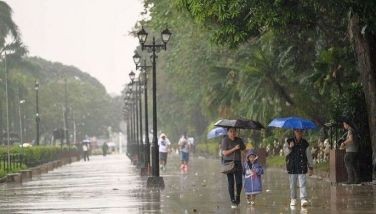Phl monitoring vs money laundering weak – US report
MANILA, Philippines - Monitoring of money laundering in the Philippines is weak as the government is faced with limited human and financial resources, according to the latest annual US State Department Report on Terrorism.
The second part of the report titled “Money Laundering and Financial Crimes†said legislation pending in the Philippine Senate seeks to address other deficiencies by expanding the definition of a money laundering offense according to standards specified by international conventions to which the Philippines is a party, and expanding the lists of covered institutions and predicate crimes.
“There is no single supervisory authority responsible for entities in the non-profit sector; coordination is insufficient. Monitoring is weak due to insufficient coordination and resources of non-profit organization regulatory bodies,†the report said.
It said the Philippines should pass the pending bill on anti-money laundering. In addition, the country should seek to include casinos in the proposed list of covered institutions.
Casinos currently are not covered under the Anti-Money Laundering Act (AMLA), and the laws surrounding online gaming are even less clear.
“While the government of the Philippines has made notable progress in enacting legislation and issuing regulations, limited human and financial resources constrain tighter monitoring and enforcement,†the report said.
In June 2012, the Philippines enacted legislation to address some noted major deficiencies. The changes authorize the Anti-Money Laundering Council (AMLC) to apply to the courts for ex-parte inquiry into deposits and investments in relation to all unlawful activities enumerated under the AMLA.
The changes also make terrorism financing a stand-alone crime and empower the AMLC to freeze funds and properties of designated terrorists and terrorist organizations, without delay, for cases involving terrorist financing.
Revised implementing rules and regulations issued in August 2012 now define a politically exposed person (PEP) and require covered institutions to take reasonable measures to determine whether a customer or beneficial owner is a PEP.
The rules call for enhanced due diligence only for domestic PEPs assessed as high risk for money laundering and terrorist financing, including obtaining senior management approval for establishing or continuing business relationships and establishing their source of wealth or source of funds.
Foreign PEPs are automatically subject to enhanced due diligence.
According to the report, the Philippines is not a regional financial center, but with a growing economy, it is increasingly becoming an important player in Asia.
“Corruption is a source of laundered funds, and smuggling, particularly bulk cash smuggling, is a major problem,†the report said.
The report said the Philippines continues to experience foreign organized criminal activity from players in China, Hong Kong and Taiwan.
It said the laws surrounding online gaming are less clear. In 2011, gaming generated $1.3 billion and the revenue streams will expand further with a large, new casino slated to open soon in Manila.
The Philippine Amusement and Gaming Corp., a fully owned government entity, regulates the gaming industry.
Insurgent groups operating in the Philippines engage in money laundering through ties to organized crime, and criminal activities are partially funded through kidnapping for ransom as well as narcotics and arms trafficking.
Remittances sent to the Philippines by its large expatriate community also provide a channel for money laundering.
However, banks and money remitters are now able to capture the bulk of remittances, approximately 80-90 percent, sent by overseas foreign workers to the Philippines.
The Philippines, dubbed the world’s texting capital, is a leader in the use of cell phone technology for funds transfers.
Although less prevalent, the Philippine government has also started using this technology for government-to-persons (G2P) payments, such as through its conditional cash transfer program.
‘Developing countries vulnerable to money laundering’
Meanwhile, mobile banking services are increasingly popular in some developing countries with such services often used on unregistered, pay-as-you-go mobile phones, making the identities of the people involved and the nature of transactions difficult to trace, the United Nations Office on Drugs and Crime (UNODC) said yesterday.
“Many developing countries are vulnerable to money laundering as a result of their largely cash-based economies and high percentages of people without bank accounts,†the UNODC said.
It said large cash payments – including for purposes such as cash smuggling and bribes – are commonplace and accepted as normal.
“People often rely on informal financial systems and other alternative remittance systems to transfer money, and these systems are difficult to monitor and regulate,†the UNODC said.
Money laundering is a complex crime to tackle as criminals go out of their way to hide their methods.
In today’s world, the UNODC said money can be moved instantly between jurisdictions, leaving efficient anti-money laundering work heavily reliant on sophisticated computer equipment and highly skilled enforcement personnel.
In many parts of the world, such crime-fighting assets cannot be taken for granted. In some countries, particularly those in the developing world, the challenges may be more fundamental, but the end result is the same, which is a financial sector vulnerable to abuse by criminals.
While much progress has been made on the legislative front, with most of the world’s countries now signed up to relevant United Nations conventions and other key international standards and agreements, the UNODC said the capacity of countries to make proper use of them varies significantly.
“There is no country that meets all the internationally agreed recommendations for anti-money laundering efforts and the challenges vary greatly between jurisdictions,†the UNODC said.
Some countries have an insufficient institutional framework with deficiencies in the regulatory system, financial intelligence unit and/or enforcement mechanisms. Others have more basic needs, such as an electronic population registry, access to fast and reliable Internet and communication services, or computer equipment and software needed to keep track of financial movements.
- Latest
- Trending































